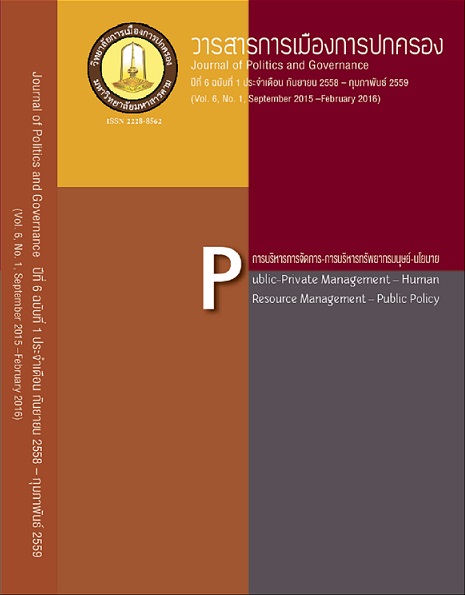Enchaining Effectiveness in Revenue Collections of Local Authorities
Main Article Content
Abstract
The objectives of this research are 1) to study structure and processes of revenues collections of the authorities, 2) to study and analyze the limitations of revenues collections of the authorities, and 3) to study and analyze guideline for enhancing effectiveness of the authorities toward revenues collections.The research findings were as follows: The findings found that although the authorities’ revenues collections created the lowest revenue compared to other revenues that have collected by the authorities. The authorities have put effort and success in collecting the revenue at some points. For example, the ratio of revenue collected by the authorities themselves are quite high when comparing with total revenue, and be able to collect the revenue as target or estimated amount. By designed mechanism of collecting the revenue that helped creates creditability of tax payers and to monitor the evaluation of the authority. This implied that the local authorities mentioned above are competent in revenues collections, and have effort to enhance their effectiveness in order to collect the revenue under limitations that they have to manage. For limitations, the finding found that there are at least four limitations. These limitations are 1) organizational administrative issue that revenue collections are still conservative, 2) taxes or service charges issue that tax base is quite narrow and not align with current economic situation, 3) officer issue that limited and lack of developing expert skills, and 4) awareness of people on willingness to pay taxes. The solutions to an improvement of revenues collection were, in the aspect of organizational management, there should be information technology used to increase the efficiency of revenues collections. Regarding structure and rules, there should be some improvements to make it compatible with the current situations. In the aspect of taxes bases, there should be some expansions in taxes bases. In the aspect of personnel, there should be increases in competencies and responsibilities. And, concerning the aspect of people, there should be announcements to make them realize the importance of taxes paying and yield the taxes.
Article Details
References
ดิเรก ปัทมสิริวัฒน์. (2549). การคลังของท้องถิ่น: รวมบทความวิจัยเพื่อเพิ่มพลังให้ท้องถิ่น. กรุงเทพฯ: พี เอ ลีฟวิ่ง.
ไททัศน์ มาลา. (2554). การปกครองท้องถิ่นไทยในระยะเปลี่ยนผ่าน. วไลยอลงกรณ์ปริทัศน์. ปีที่ 1 ฉบับที่ 2 (กรกฎาคม-ธันวาคม): 29-50.
ไททัศน์ มาลา, วลัยพร ชิณศรี และวิไลลักษณ์ เรืองสม. (2557). การพัฒนาศักยภาพในด้านการจัดเก็บรายได้ขององค์กรปกครองส่วนท้องถิ่น. ใน การประชุมวิชาการมนุษยศาสตร์และสังคมศาสตร์ระดับชาติและนานาชาติ ครั้งที่ 1 ณ KU HOME มหาวิทยาลัยเกษตรศาสตร์. หน้า 194-200.
วลัยพร ชิณศรี. (2556). การกระจายอำนาจทางการคลัง: มิติใหม่และสิ่งท้าทายต่อองค์กรปกครองส่วนท้องถิ่นไทย. รัฐสภาสาร. ปีที่ 61 ฉบับที่ 11: 72-102.
วลัยพร ชิณศรี, ไททัศน์ มาลา และวิไลลักษณ์ เรืองสม. (2557). การเสริมสร้างประสิทธิภาพขององค์กรปกครองส่วนท้องถิ่นเพื่อความเป็นเลิศในด้านการจัดเก็บรายได้. รายงานวิจัยเสนอต่อ สำนักงานกองทุนสนับสนุนการวิจัย (สกว.).
สกนธ์ วรัญญวัฒนา. (2553). วิถีใหม่การพัฒนารายรับท้องถิ่นไทย. นนทบุรี: สถาบันพระปกเกล้า.
Shah, Anwar. (2007). PUBLIC SECTOR GOVERNANCE AND ACCOUNTABILITY SERIES PARTICIPATORY BUDGETING. Ed. Anwar Shah. Washington, DC: World Bank.


